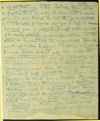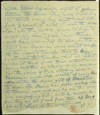Mahatma Letter No. 60
| Quick Facts | |
|---|---|
| People involved | |
| Written by: | Koot Hoomi |
| Received by: | A. P. Sinnett |
| Sent via: | unknown |
| Dates | |
| Written on: | unknown |
| Received on: | June 1882 – see below |
| Other dates: | unknown |
| Places | |
| Sent from: | unknown |
| Received at: | Allahabad, India |
| Via: | unknown |
This is Letter No. 60 in The Mahatma Letters to A. P. Sinnett, 4th chronological edition. It corresponds to Letter No. 76 in Barker numbering. This is a continuation of Letter No. 59
< Prev letter chrono
Next letter chrono >
< Prev letter Barker
Next letter Barker >
Page 1 transcription, image, and notes
|
X. . . Chela training. Poor Subba Row is "in a fix" — that is why he does not answer you. On one hand he has the indomitable H.P.B. who plagues Morya's life to reward you and M. himself who would if he could gratify your aspirations; on the other he encounters the impassable Chinese wall of rules and Law. Believe me, good friend, learn what you can under the circumstances — to viz. — the philosophy of the phenomena and our doctrines on Cosmogony, inner man, etc. This Subba Row will help you to learn, though his terms — he being an initiated Brahmin and holding to the Brahmanical esoteric teaching — will be different from those of the "Arhat Buddhist" terminology. But essentially both are the same — identical in fact. My heart melts when I read Mr. Hume's sincere |
NOTES:
|
Page 2
|
noble letter — especially what I perceive between the lines. Yes; to one from his standpoint our policy must seem selfish and cruel. I wish I were the Master! In five or six years I hope to become my own "guide" and things will have somewhat to change, then. But even Caesar in irons cannot shuffle off the irons and transfer them to Hippo or Thraso the turnkey. Let us wait. I cannot think of Mr. Hume without remembering each time an allegory of my own country: the genius of Pride watching over a treasure, an inexhaustible wealth of every human virtue, the divine gift of Brahma to man. The Genius has fallen asleep over its treasure now, and one by one the virtues are peeping out. . . . Will he awake before they are all freed from their life long bonds? That is the question — |
NOTES:
|
Context and background
Letters Nos. 59 and 60 must be considered together, as they are actually not two letters but one. Letter No. 59 consists of extracts from a letter from T. Subba Row to H. P. Blavatsky concerning instructions to A. P. Sinnett. Letter No. 60 is its continuation. The extracts are conveyed by Mahatma KH through H. P. Blavatsky. Probably all the pages of letters 59 and 60 were precipitated using the handwriting of Subba and KH.
Physical description of letter
The original is in the British Library, Folio 3. According to George Linton and Virginia Hanson,
ML-132 consists of abstracts from a letter from TSR to HPB about APS's instruction in occultism, together with comments by KH on both sides of sheet in blue pencil. ML-76 is a continuation of KH's comments (accidentally separated). TSR's writing is on thin rice paper. ML-76 is in blue pencil on rough parchment paper with rough edges.[1]
Publication history
Commentary about this letter
Notes
- ↑ George E. Linton and Virginia Hanson, eds., Readers Guide to The Mahatma Letters to A. P. Sinnett (Adyar, Chennai, India: Theosophical Publishing House, 1972), 112.

